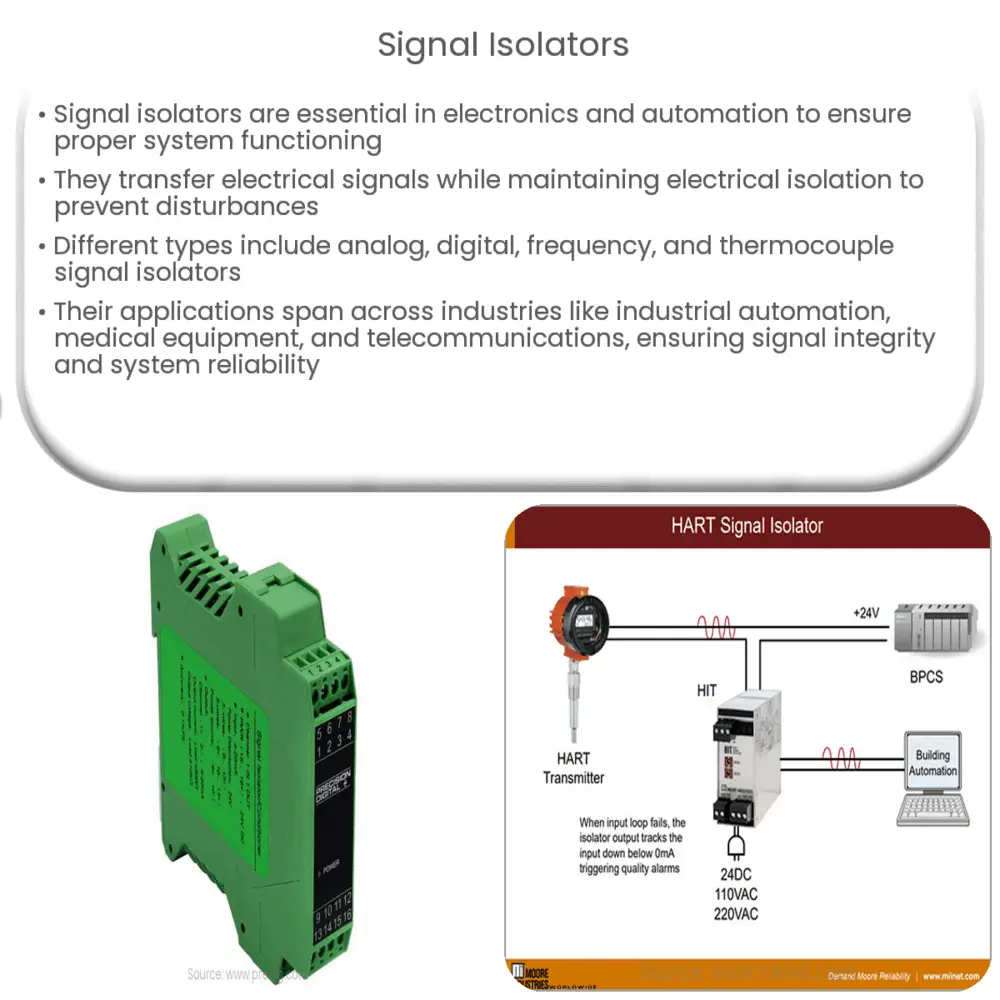Explore the significance of signal isolators, their types, operation, and applications in various industries like automation, healthcare, and telecom.

Introduction to Signal Isolators
Signal isolators are crucial components in the world of electronics and automation. They play a fundamental role in ensuring the proper functioning of various systems and devices. Understanding their operation, types, and applications can provide a comprehensive view of their importance in the field.
What are Signal Isolators?
Signal isolators are devices used to transfer electrical signals from one part of a system to another, while maintaining a high degree of electrical isolation between the input and output. This isolation is crucial to prevent noise, surges, or ground loops that could harm sensitive equipment or distort the signal.
How do Signal Isolators Work?
Signal isolators function by taking an input signal (which can be voltage, current, frequency, or others) and converting it into a form that can be safely transmitted across an isolation barrier. This process often involves transforming the signal into a light, magnetic, or other non-electrical form, transmitting it across the isolation barrier, then converting it back into an electrical signal on the other side. This ensures that any electrical disturbances do not pass through the isolator.
Types of Signal Isolators
- Analog Signal Isolators: These isolators are used for analog signals such as current and voltage signals. They help in eliminating ground loops and provide protection against electrical noise.
- Digital Signal Isolators: These isolators are used for digital signals. They ensure that digital data is transmitted accurately and without interference.
- Frequency Signal Isolators: These isolators are used when the signal being transmitted is a frequency. They help in maintaining the integrity of frequency signals.
- Thermocouple Signal Isolators: These isolators are specifically used for signals from thermocouples. They help in eliminating ground loops and provide signal conditioning.
Applications of Signal Isolators
- Industrial Automation: In industrial settings, signal isolators are used to protect control systems and ensure accurate signal transmission.
- Medical Equipment: In medical devices, signal isolators are crucial for patient safety, as they prevent any potentially harmful electrical signals from reaching the patient.
- Telecommunications: Signal isolators are used in telecommunications to ensure accurate data transmission and protect equipment from electrical disturbances.
Understanding Signal Isolators in Greater Detail
The operation of signal isolators may seem straightforward, but there are a number of sophisticated technologies and principles at play. For instance, some signal isolators use optical isolators, which use light to transmit the signal. Others may use transformers, which use magnetic fields to achieve the same purpose. Regardless of the method used, the goal is the same: to create a barrier that prevents electrical disturbances from affecting the signal.
Choosing the Right Signal Isolator
With the various types of signal isolators available, choosing the right one depends on the specific requirements of the application. Considerations include the type of signal (analog, digital, frequency, etc.), the level of isolation required, and the specific environmental conditions (such as temperature, humidity, and electromagnetic interference).
Signal Isolators and Industry Standards
Signal isolators need to comply with certain industry standards, particularly when used in sensitive applications like medical devices or aviation systems. These standards ensure that the isolators function reliably and safely, even under challenging conditions. They cover aspects like electrical isolation, signal integrity, and resistance to environmental factors.
Advantages of Using Signal Isolators
- Improved Signal Quality: By eliminating ground loops and reducing noise, signal isolators ensure that the signal quality is maintained.
- Increased Safety: Signal isolators provide an effective barrier against electrical disturbances, protecting both equipment and operators.
- Greater System Reliability: With fewer disturbances and less potential for damage, systems that incorporate signal isolators are generally more reliable.
Conclusion
In conclusion, signal isolators are indispensable tools in various industries including telecommunications, industrial automation, and healthcare. They ensure signal integrity, protect sensitive equipment, and increase overall system reliability. As our reliance on electronic systems continues to grow, the importance of understanding and effectively using signal isolators cannot be overstated. With their ability to maintain signal quality and enhance system performance, signal isolators remain a cornerstone of modern electronic design and application.

